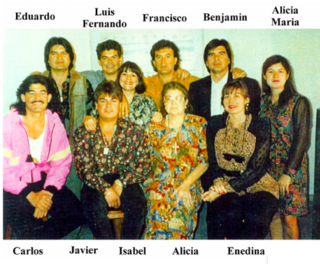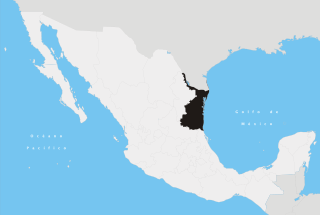
Don Winslow is an American retired author best known for his award-winning and internationally bestselling crime novels, including Savages, The Force and the Cartel Trilogy.

Juan Jesús Posadas Ocampo was an Archbishop of the Catholic Church in Mexico who served as the eighth archbishop of the see of Guadalajara and as a cardinal of the Roman Catholic Church.

Francisco Rafael Arellano Félix was a Mexican drug lord and former leader of the Tijuana Cartel, a drug trafficking organization. He was the oldest of seven brothers and headed the criminal organization early in the 1990s alongside them. Through his brother Benjamín, Francisco Rafael joined the Tijuana Cartel in 1989 following the arrest of Miguel Ángel Félix Gallardo, one of the most prominent drug czars in Mexico during the 1980s. When the Arellano Félix took control of the organization in the early 1990s, tensions with the rival Sinaloa Cartel prompted violent attacks and slayings from both fronts.
Miguel Ángel Félix Gallardo, commonly referred to by his aliases El Jefe de Jefes and El Padrino, is a convicted Mexican drug lord and a former Federal Judicial Police agent. He was one of the founders of the Guadalajara Cartel in the 1970s. Throughout the 1980s, the cartel controlled much of the drug trafficking in Mexico and the corridors along the Mexico–United States border.
The Guadalajara Cartel also known as The Federation was a Mexican drug cartel which was formed in 1980 by Miguel Ángel Félix Gallardo, Rafael Caro Quintero, and Ernesto Fonseca Carrillo in order to ship cocaine and marijuana to the United States. Among the first of the Mexican drug trafficking groups to work with the Colombian cocaine mafias, the Guadalajara Cartel prospered from the cocaine trade. Throughout the 1980s, the cartel controlled much of the drug trafficking in Mexico and the corridors along the Mexico–United States border. It had operations in various regions in Mexico which included the states of Jalisco, Baja California, Colima, Sonora, Chihuahua and Sinaloa among others. Multiple modern present day drug cartels such as the Tijuana, Juárez and Sinaloa cartels originally started out as branches or "plazas" of the Guadalajara Cartel before its eventual disintegration.

Eduardo Arellano Félix is a Mexican drug trafficker, brother of Benjamín, Ramón, Javier and sister, Enedina, all drug traffickers. The Arellano-Félix Organization, also known as the Tijuana Cartel, has been responsible for numerous murders and the smuggling of thousands of tons of marijuana, cocaine, heroin and methamphetamine for more than a decade. The DEA believes that the Arellano-Félix brothers were responsible for the numerous smuggling tunnels that were found in January 2006.
The Colima Cartel was a Mexican drug trafficking and methamphetamine producing cartel operating in Guadalajara, Jalisco. It was founded and led by José de Jesús Amezcua Contreras and supported by his brothers Adán and Luis.
José de Jesús Amezcua Contreras (born c. 1975, along with his brothers Adán and Luis, was a leader of the Colima Cartel, a Mexican methamphetamine and meth-precursor smuggling organization.

Héctor Luis Palma Salazar, commonly known as "El Güero Palma", is a Mexican former drug trafficker and leader of the Sinaloa Cartel alongside Joaquín "El Chapo" Guzmán and Ismael Zambada García. After the brutal murder of his family ordered by his boss Miguel Ángel Félix Gallardo, Palma engaged in a string of vicious crimes to avenge his lost ones. Palma was arrested on June 23, 1995, and extradited to the United States where he served a jail sentence until June 2016. He was then deported back to Mexico and charged with a double homicide for having murdered two Nayarit police officers back in 1995. Palma is currently incarcerated at the Altiplano Prison, near Mexico City.
Ernesto Fonseca Carrillo, commonly referred to by his alias Don Neto, is a Mexican drug lord and former leader of the Guadalajara Cartel, a defunct criminal group based in Jalisco. He headed the organization alongside Miguel Ángel Félix Gallardo, and Rafael Caro Quintero. Fonseca Carrillo was involved with drug trafficking since the early 1970s, primarily in Ecuador, and later moved his operations to Mexico.

Juan José Esparragoza Moreno, commonly referred to by his alias El Azul, is a Mexican drug lord and member of the Sinaloa Cartel, Guadalajara Cartel and Juárez Cartel, three large and powerful criminal organizations. Originally a member of the Dirección Federal de Seguridad (DFS) police agency, he founded the Guadalajara Cartel in the 1970s along with other drug kingpins in Mexico. Following its disintegration in the late 1980s, he went on to lead the Juárez Cartel and eventually settled in the Sinaloa Cartel. He worked alongside Joaquín "El Chapo" Guzmán and Ismael Zambada García, once considered world's most-wanted, powerful and rich drug lords.

The Sinaloa Cartel, also known as the CDS, the Guzmán-Zambada Organization, the Pacific Cartel, the Federation and the Blood Alliance, is a large, international organized crime syndicate that specializes in illegal drug trafficking and money laundering. It was established in Mexico during the late 1980s as one of a various number of subordinate "plazas" operating under a predecessor organization known as the Guadalajara Cartel. It is currently headed by Ismael Zambada García and is based in the city of Culiacán, Sinaloa, with operations in many world regions but primarily in the Mexican states of Sinaloa, Baja California, Durango, Sonora, and Chihuahua. and presence in a number of other regions in Latin America as well as in cities across the U.S. The United States Intelligence Community generally considers the Sinaloa Cartel to be the largest and most powerful drug trafficking organization in the world, making it perhaps even more influential and capable than Pablo Escobar's infamous Medellín Cartel of Colombia was during its prime. According to the National Drug Intelligence Center and other sources within the U.S. the Sinaloa Cartel is primarily involved in the distribution of cocaine, heroin, methamphetamine, fentanyl, cannabis and MDMA.
A drug lord, drug baron, kingpin, or narcotrafficker is a type of crime boss, who is in charge of a drug-trafficking network, organization, or enterprise.
Luis Fernando Sánchez Arellano, commonly referred to by the alias El Ingeniero ("The Engineer"), is a Mexican suspected drug lord and former leader of the Tijuana Cartel, a drug trafficking organization based in Tijuana, Baja California. He competed with three other major cartels, the Juárez Cartel, the Gulf Cartel, and the Sinaloa Cartel, for the illegal drug corridors into the United States.

Enedina Arellano Félix de Toledo is a Mexican drug lord who, alongside her brothers, founded the Tijuana Cartel and played a role as a logistical accountant for the criminal organization.

Benjamín Arellano Félix is a Mexican former drug lord who alongside his brothers founded and led the Tijuana Cartel or "Arellano-Félix Organization” until his arrest in March 2002.

Jorge Luis Mendoza Cárdenas, commonly referred to by his alias La Garra, is a Mexican suspected drug lord and high-ranking leader of the Jalisco New Generation Cartel (CJNG), a criminal group based in Jalisco. Security forces suspect that La Garra heads the drug trafficking operations for the CJNG in the United States under Nemesio Oseguera Cervantes, the top leader of the criminal group. La Garra reportedly coordinates marijuana, cocaine, heroin, and methamphetamine shipments to Los Angeles, San Jose, Atlanta, and New York City from Mexico.

Narcos: Mexico is an American crime drama streaming television series created and produced by Chris Brancato, Carlo Bernard, and Doug Miro that premiered on Netflix on November 16, 2018. It was originally intended to be the fourth season of the Netflix series Narcos, but it was ultimately developed as a companion series. It focuses on the development of Mexico's illegal drug trade, whereas the parent series centered on the establishment of Colombia's illegal drug trade. The series' second season premiered on February 13, 2020. On October 28, 2020, Netflix renewed the series for a third and final season but announced that actor Diego Luna would not be returning to reprise his role as Félix Gallardo. The third and final season premiered on November 5, 2021.

On 9 November 1999, two agents from the United States Drug Enforcement Administration (DEA) and Federal Bureau of Investigation (FBI) were threatened at gunpoint and nearly killed in Matamoros, Tamaulipas, Mexico, by gunmen of the Gulf Cartel, a criminal group based in the area. The two agents traveled to Matamoros with an informant to gather intelligence on the operations of the Gulf Cartel. As they cruised through one of the properties owned by the criminal group, they noticed several vehicles following them. The agents were forced to a stop and were corralled by a convoy of eight vehicles, from which fifteen gunmen emerged and surrounded the agents' car. Some of them wore uniforms of the local police. Among the gunmen was the former kingpin Osiel Cárdenas Guillén, who recognized the informant and ordered the three of them to get out of their vehicle.











